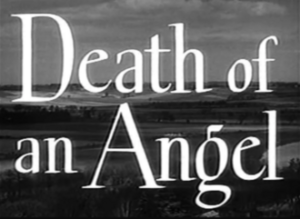Death of an Angel ** (1952, Patrick Barr, Jane Baxter, Jean Lodge, Raymond Young, Russell Napier, Russell Waters, Katie Johnson) – Classic Movie Review 13,068
Hammer Films’ modestly diverting 1952 British murder mystery B film Death of an Angel features Patrick Barr, Jane Baxter, Jean Lodge, Raymond Young.
Director Charles Saunders’s modestly diverting 1952 British black and white Hammer Film Productions crime drama B film Death of an Angel features Patrick Barr, Jane Baxter, Jean Lodge, Raymond Young, Russell Napier, Russell Waters, Katie Johnson, and Frank Tickle. It is filmed at Hammer’s Bray Studios in Berkshire.
Ah the days when a strong cup of tea fixed everything, everyone had perfect diction, and the Light Programme closed down for the night at a proper hour! Ah, well, it was a very long time ago. Actually, in England at the time, a strong cup of tea didn’t actually fix everything, well not cases of murder at least, and if the films were anything to go by, there were a lot of cases of murder, even though the penalty was being hanged if you were caught.
Patrick Barr stars as Robert Welling, an apparently ailing older doctor in a rural area in England takes on a newly arrived younger physician, Chris Boswell (Raymond Young) as his partner in his practice to help out. When the older doctor’s wife (Jane Baxter) is found in agony on her bed via taking arsenic, and then dies in hospital, the doctor becomes the chief suspect, especially when he suddenly disappears. But their annoying, talkative teenage daughter Judy (Julie Somers) might actually have been the one to have administered the poison. The doc’s new partner Chris and his practice nurse Ann Marlow (Jean Lodge) do not believe he did it, though, and set out to find both him and the real killer.
The screenplay is by Reginald Long based on the play This is Mary’s Chair by Frank King. The main problem is with the patchy, uneven screenplay, which is very talky and unexciting in places, though in others reasonably intriguing and suspenseful. The murder mystery plot itself is serviceable enough, though nothing to write home about. The second problem is with the performances, some of which are pretty indifferent, with little known Raymond Young actually having the main role as the investigating young doctor, and Jean Lodge as the second lead role, the practice nurse. Both actors are engaging enough, without being able to go that extra mile a true star could do.
Patrick Barr is quite good is his scenes, but, despite his star billing his role demands he is off-screen a lot of the time. Russell Napier is very good as the pushy, barely polite police inspector, Superintendent Walshaw, creating an involving character out of a stereotype. Russell Waters is quite amusing as the boring neighbour, local bank manager Walter Grannage, though he does tend to overegg the pudding. There are a few precious moments with Katie Johnson from The Ladykillers as ailing old Sarah Oddy, She’s the classiest thing in the film, so why couldn’t they have given her more to do?
OK it is only a humble B film, quickly and cheaply shot, but it is very plainly filmed, with virtually no directorial flourishes, imagination, style or flair. The film doesn’t flow too smoothly, and the chase climax is rushed whereas the rest of the film often runs slow. Meanwhile the score by Frank Spencer may be fine in itself but the use of it is a shade intrusive and irritating, The few moments when the score stops, it is actually a better film.
The cast are Patrick Barr as Robert Welling, Jane Baxter as Mary Welling, Julie Somers as Judy Welling, Raymond Young as Chris Boswell, Jean Lodge as Ann Marlow, Russell Waters as Walter Grannage, Russell Napier as Superintendent Walshaw, Katie Johnson as Sarah Oddy, June Bardsley as nurse, David Stoll as plainclothes policeman Duggie Ascot as taxi driver, Robert Brown as Jim Pollard, John Kelly as PC Janes, James Mills as Howard, Hal Osmond as railway porter, and Frank Tickle as Sam Oddy.
The Hammer boss Michael Carreras gives himself a credit for casting, but I’ve got to say the casting could be better.
There is very little outside shooting, unfortunately, (apart from the rail station scenes and the finale in a mill house), but that village cricket ground is Maidenhead and Bray Cricket Club, at Bray, Berkshire.
Death of an Angel runs 64 minutes, is directed by Charles Saunders, is made by Hammer Films, is distributed by Exclusive Films, is written by Reginald Long, based on the play This is Mary’s Chair by Frank King, is produced by Anthony Hinds and Julian Lesser, is shot by Walter J Harvey, and is scored by Frank Spencer.
Release date: January 1952.
English stage, film and television actress Jean Lodge was born on 4 August 1927.
© Derek Winnert 2024 – Classic Movie Review 13,068
Check out more reviews on http://derekwinnert.com6


